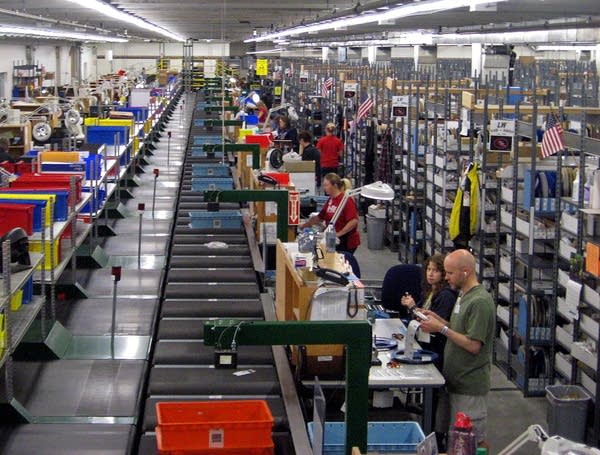Managing COVID-19 is part of the new business reality for Thief River Falls' DigiKey

Go Deeper.
Create an account or log in to save stories.
Like this?
Thanks for liking this story! We have added it to a list of your favorite stories.
DigiKey is an international company with offices in Asia and Europe, but its headquarters are in Thief River Falls, Minn. The electronic parts supplier is a major employer in northwest Minnesota: About 3,800 employees are based at the company’s headquarters.
Shortly after COVID-19 began to spread in Minnesota, the company shifted about 2,000 of those employees — who take orders, manage customer relationships and handle administrative tasks — to working remotely.
That left about 1,800 workers still reporting to the company’s sprawling warehouse complex to keep thousands of shipments of electronic parts flowing to customers around the world every day.
"We told employees from Day One, it's going to hit our facilities,” said DigiKey’s vice president for human resources, Shane Zutz. “We're not going to shy away from that; we're going to prepare everything up front and do everything we can."
Turn Up Your Support
MPR News helps you turn down the noise and build shared understanding. Turn up your support for this public resource and keep trusted journalism accessible to all.

The company is taking precautions to stave off what leaders fear is the inevitable, he said. Workers now stay in specified zones within the warehouse to limit their exposure to other people, in case any of their colleagues becomes ill. They take five minutes every hour to sanitize workspaces. They’re required to wear masks and socially distance. Incoming truckloads are fogged with disinfectant, and the plastic totes workers fill with packages are sanitized with UV light.
Several meatpacking plants in Minnesota have had significant outbreaks of COVID-19. A wind turbine manufacturer in Grand Forks, N.D., was forced to temporarily close in April after dozens of workers tested positive for the coronavirus.
But so far, more than three months in to the pandemic’s spread in Minnesota, DigiKey says only four of its employees have tested positive for COVID-19 — two in Thief River Falls and two at a smaller warehouse in Fargo, N.D., but all four have recovered.
Zutz said the experience managing those cases make him confident the company can contain cases and not have to shut down the whole operation.
"As a major employer, if DigiKey was to shut down or something it would be really, really impactful to the economy, especially in northwest Minnesota," he said.
The company is using that message to encourage workers to take the COVID-19 threat seriously at work, and while they are out in the community. While Zutz said “we can’t be the DigiKey police,” the company is urging workers to wear masks and practice social distancing when they are not at work.
"But you know, I'm not going to sugarcoat it. Just like any other organization, I would guarantee we have people that probably are not taking part the way they should," said Zutz.
The company regularly audits its COVID-19 protocols to make sure employees are wearing masks, cleaning and following other recommendations, but Zutz said success will require buy-in from employees.
"When people are flippant about COVID, that's fine, you're entitled to your opinion, but let's just say we ever had to shut this down and have 2,000 people go home for a week. That impact is far reaching — way beyond Thief River Falls," he said.
Because the company’s main distribution warehouse is in Thief River Falls, any closure would have ripple effects for manufacturing companies across the world, said Zutz.
Companies face a lot of options when trying to prevent the spread of COVID-19, especially in warehouses and factories. They need to balance cost, or slowing down production, with protection of employees, said University of Minnesota professor Pete Raynor, who leads the university’s industrial hygiene program.
Raynor said the most visible changes companies have been making are requiring employees to wear masks and gloves, but those efforts also offer the lowest level of protection from the highly contagious coronavirus.
"Because they're highly variable, they rely on the person wearing them to wear them right all the time," he said.
And while efforts like requiring masks and social distancing — administrative controls — are effective, engineering controls — like physical barriers between workers and more fresh air and filtration throughout a facility — are more effective.
Some of those engineering changes, though, can be expensive.
"There could be some costs, but I think they're a lot less than if you do have an outbreak in your workplace and you're not able to produce a product, or you have a workforce that becomes disenchanted and doesn't feel like they're protected or cared for," said Raynor.
And he said the changes required for businesses to manage the pandemic will be needed for a while: At least until there is a widely available vaccine, or so many people are exposed to the coronavirus that the population reaches herd immunity, in which the spread of the virus slows.
DigiKey’s pandemic response will mean permanent changes for the way the company operates. It has already decided to continue offering more flexible work from home options for employees, said Zutz
And employees are a critical part of planning how DigiKey might operate differently in the future.
"You have to really take that business piece and you have to take that people piece and they have to move along side by side,” said Zutz “There's a lot of businesses that are not going to come out of COVID as well because they're only making decisions on the business side."


